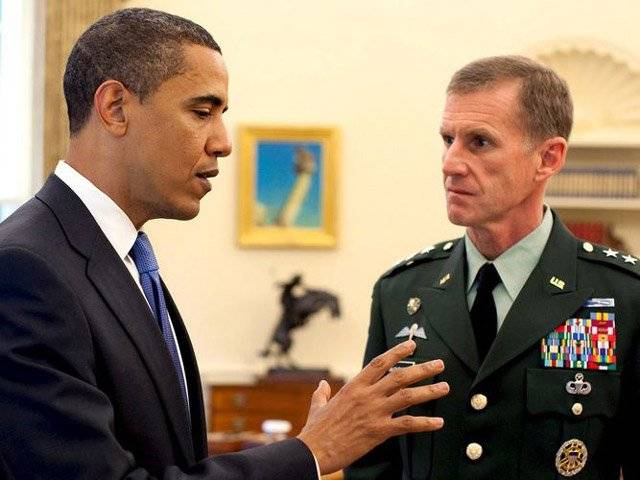A refusal by President Obama to heed an urgent call for more troops in Afghanistan has opened an increasingly bitter divide between the American military and the White House and exposed confusion in US strategy. Senior military officials expressed their alarm over Mr Obamas decision to spend weeks, and maybe months, considering the opinion of General Stanley McChrystal, the US commander in Afghanistan, who said last week that the war was likely to be lost without a rapid surge of additional troops. General McChrystal believes that the only way to avoid defeat in Afghanistan is significantly to increase US troop levels to safeguard the population, fight the Taleban and reconstruct the countrys civilian infrastructure a strategy endorsed by Mr Obama in a speech on March 27. However, General McChrystal is now confronting a growing number of civilian policymakers, led by Vice-President Joe Biden, who do not want any more troops sent to Afghanistan, instead advocating a far narrower, less costly counter-terror strategy focused on defeating al-Qaeda. Mr Obama has himself questioned the strategy that he introduced in March, which he said at the time marks the conclusion of a careful policy review. On Sunday he said: The first question is are we pursuing the right strategy? Even more tellingly, the President said that his core goal was to destroy al-Qaeda, which is not present in significant numbers in Afghanistan. He did not focus on saving Afghanistan, a theatre of war that he called his number one foreign policy priority when he took office in January. In another sign of the stiffening resistance within civilian elements of the Obama Administration to a major military escalation, Hillary Clinton, the Secretary of State, on Monday expressed respect for the generals assessment, but added: There are other assessments from very expert military analysts who have worked in counter-insurgencies that are the exact opposite. It is unclear which military analysts Mrs Clinton was referring to. It is understood that General David Petraeus, head of US Central Command who executed George W Bushs Iraq surge, and Admiral Mike Mullen, Chairman of the Joint Chiefs, have endorsed General McChrystals call for an urgent infusion of more troops. Two main factors have significantly altered the situation on the ground since March, and are giving Mr Obama and his advisers pause. The first was last months presidential election. Far from giving the troubled government of Hamid Karzai more stability and legitimacy, as had been hoped, the ballot has instead become mired in allegations of fraud. Mr Obama is now reluctant to send more troops until the myriad problems surrounding the election have been resolved. It has also led to doubts within the Administration that, even with thousands more troops, the US can prevail without a legitimate and less corrupt central government in Kabul. The second is a huge increase in Taleban attacks, which have led to US troops now dying at the highest rate since the war began eight years ago. That, in turn, has led to a rapid decline in public support for the mission and widespread opposition among Democrats to sending more troops. A recent CNN poll found that 58 per cent of Americans oppose the war, with just 39 per cent in support. The central dilemma for Mr Obama is that any course of action is fraught with risk. Should he send more troops, but lose the war, it will be a catastrophe for him. Should he fail to do so or even scale back the military commitment and lose the war, he will be branded a weak and failed commander-in-chief. Republicans are demanding that he follows General McChrystals advice. John Boehner, a leading Republican, said that he was deeply troubled by reports that the White House was delaying action on the generals request for more troops. Its time for the President to clarify where he stands on the strategy he has articulated, he said. (The Times)
Thursday, April 18, 2024
Obama opens rift with McChrystal over Afghan strategy: report

Jailed Myanmar leader Suu Kyi moved to house arrest
April 18, 2024
Jahangir Khan PSA Satellite Squash Series strats
April 18, 2024
Pakistan women face West Indies women in first ODI today
April 18, 2024
Asad, Amir reach PTLA Junior National Tennis semis
April 18, 2024
Rail Revival
April 17, 2024
Addressing Climate Change
April 17, 2024
Saudi Investment
April 17, 2024
Political Reconciliation
April 16, 2024
Pricing Pressures
April 16, 2024
Workforce inequality
April 17, 2024
New partnerships
April 17, 2024
Shikarpur crisis
April 17, 2024
Peace quest
April 17, 2024
Democratic harmony
April 16, 2024
ePaper - Nawaiwaqt
Advertisement
Nawaiwaqt Group | Copyright © 2024





